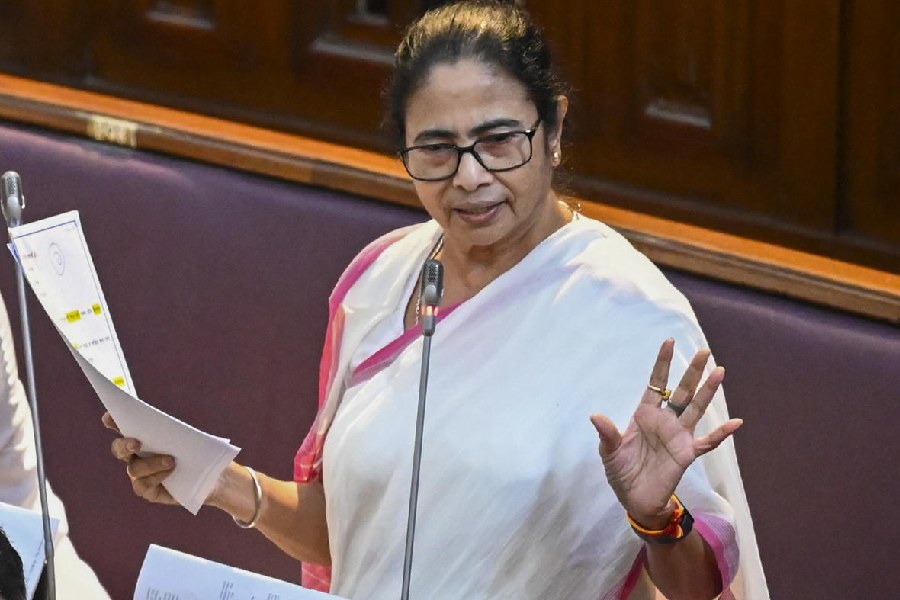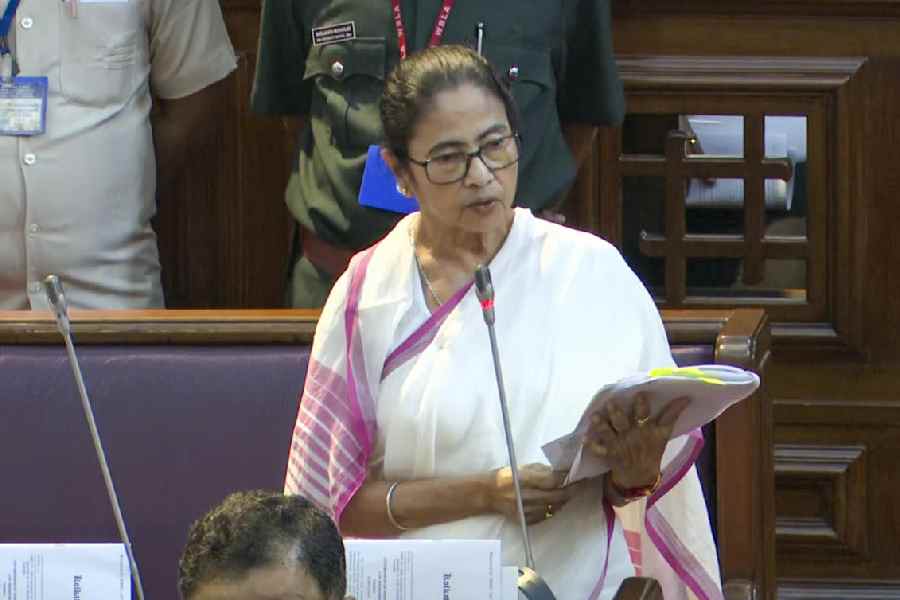West Bengal Chief Minister Mamata Banerjee on Tuesday demanded the resignation of Prime Minister Narendra Modi, Union Home Minister Amit Shah and the chief ministers of all states that have "not been able to implement effective legislations to safeguard women."
Speaking in the assembly after tabling Aparajita Woman and Child (West Bengal Criminal Laws and Amendment) Bill 2024, Banerjee said the proposed legislation aimed at quick investigation, fast justice delivery and enhanced punishment of the guilty.
Amid chaotic scenes on the floor of the House when BJP legislators raised slogans demanding the chief minister's resignation over the alleged rape and murder incident at RG Kar Medical College and Hospital, Banerjee also demanded the resignation of Suvendu Adhikari, the Leader of the Opposition, for obstructing the proceedings for passage of the Bill.
"We wanted the Centre to amend its existing laws and include stricter clauses to ensure exemplary punishment for perpetrators and quicker justice to victims. They showed no enthusiasm for it. That's why we made the move first. This Bill, once enacted, can serve as a model for the rest of the country," the chief minister said.
Banerjee also tabled the two letters she recently wrote to PM Modi in this regard, one of which was a counter statement to Union Women and Child Development Minister Annapurna Devi's response to her first letter.
"I demand the resignation of PM Modi, Home Minister Amit Shah and chief ministers of all states that have failed to implement effective laws that can ensure security of women and children across the country," she stated.
"Rape is a curse against humanity and social reforms are required to prevent such crimes," she said.
Once this Bill is passed, the state will form a special Aparajita Task Force from among the state police force to ensure time-bound completion of the probe, the chief minister says.
Hailing the Bill as "historic", Banerjee said that through this proposed legislation, her government tried to plug the loopholes that existed in the central legislations in terms of speedy and effective disposal of justice to victims and their kin.
The chief minister informed the House that the day of introduction of the Bill coincided with the 1981 UN convention on elimination of all forms of discrimination against women.
"This coincidence gives me goosebumps. You should be thrilled as well," she said, pointing at the opposition benches.
When BJP MLAs raised slogans and showed placards demanding her resignation, she retorted, "What if I raise slogans against the prime minister and the home minister for the same reasons you are raising slogans against me."
She claimed that states like Uttar Pradesh and Gujarat had abnormally high crime rates against women whereas in West Bengal, tortured women were receiving justice in courts.
Responding to a question from Adhikari, Banerjee said, "We have 88 fast track courts in West Bengal, the third highest among all states in the country, and over 50 designated courts for crimes against women. These courts have so far disposed of 3,11,479 of the 3,92,620 cases registered. Some 7,000 cases concerning women currently remain under adjudication before the courts."
Banerjee alleged that West Bengal was not consulted before passing BNS. "We wanted discussions on it after the formation of the new government at the Centre," she said.
Banerjee urged the Opposition to impress upon the governor to sign the Bill without delay. She asserted that it was the state government's responsibility for the effective enactment following the assent of Raj Bhavan and the President.
"We want justice from the CBI and death by hanging of the guilty," Banerjee said over the rape and murder of the RG Kar medic while expressing her sorrow over the gruesome crime and sympathies for the victim's kin.
Referring to the infamous 2013 Kamduni village gang rape and murder case in Bengal, Banerjee claimed the state did everything in its power to send the perpetrators to the gallows but failed because the high court felt otherwise.
The Bill was later passed unanimously despite disgruntled opposition members choosing to call the Bill an "eyewash" after the government rejected most of the amendments moved by Adhikari to it.
Except for the headline, this story has not been edited by The Telegraph Online staff and has been published from a syndicated feed.












